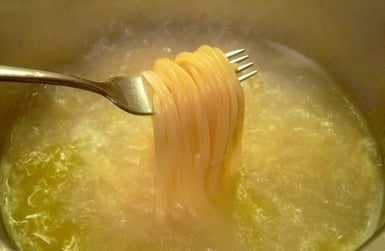As parents we stopped asking questions about certain things long ago. “Why is the sky blue?” for example, or, “Why do cats have whiskers?” We enjoy hearing a child ask these sorts of questions, however, because they remind us to wonder at the beauty of God’s creation.
As an adult, I have developed the habit of bringing my child-like questions to God, our Heavenly Father. I bring them to him with the attitude of the father of a demon-possessed boy in Mark 13 who exclaimed, "I do believe; help me overcome my unbelief.” My questions always begin, “God, I believe what you have revealed though scripture and tradition, but I was wondering…”
I can almost see God kneel down and pat me on the head when I tug on his heavenly robes in this way.
“My dear, Heidi, it’s just not as complex as you think,” he grins.
“Yes, Lord, I know,” I respond, “but I’m still not getting it. Could you give me a visual aid?”
About five years ago I began asking God to help me understand a mystery about Mary. I couldn’t grasp that if sin is what condemns us to hell, and Mary never sinned, then why did she need Jesus as her Savior? Years went by with no insight provided. Then, while the kids and I were preparing lunch recently, I had a revelation.
My ten-year-old had just put a pot of water on the stove to boil spaghetti when she asked how high she should turn the heat. I replied without thinking, “You can turn it on as high as you would like; water doesn’t burn.” Sitting nearby, my eight-year-old thought this very curious and asked, “Why not?”
“Well,” I explained, “because water evaporates instead of burning.” As those words slipped out of my mouth, my son’s question became a word picture to answer my question about why Mary needed a savior, too. I’ll explain in non-scientific terms the insight God gave me.

Water is a not like regular ‘stuff.’ Stuff burns. Water does not. In the same way that we throw water on stuff to stop it from burning, it is the presence of water inside of stuff that can prevent it from burning in the first place.
An example of the first situation would be throwing dry spaghetti noodles into a hot fire. In a few seconds the dehydrated pasta would burst into flames. To save the spaghetti from burning we would have to pour water on it.
An example of the second situation would be putting spaghetti sauce in a hot pan. Due to the presence of water in the tomatoes, the sauce wouldn’t burn as quickly as the noodles did. Pre-existing water in the sauce would prevent it from burning.
In both situations, however, it is the water that saves the stuff from burning.
If we go back and substitute “Jesus” for “water”, we see that our condition at conception is much like that of the dry pasta. We are born dehydrated or without the grace of God due to original sin. In order to be saved, we have to have the waters of baptism or the grace of God poured over us and into our lives. Mary, on the other hand, was born fully hydrated or “full of grace,” as the angel called her at the Annunciation. Mary’s condition was more like that of the spaghetti sauce. In both situations, however, it is Jesus that saves both us and Mary.
I know that mystery is a part of the faith life, but I believe God delights in the deeper questions and wonderings of his earthly children. I further believe that he wants to help us understand our faith more fully and will therefore answer our questions, even if it takes years. If there is something you’ve been wondering about, I encourage you to give a little tug and say, “Father, I believe, but I was just wondering…”
Copyright 2014, Heidi Bratton
Except from Homegrown Faith; Nurturing Your Catholic Family, by Heidi Bratton (Servant Books)
About the Author

Guest
We welcome guest contributors who graciously volunteer their writing for our readers. Please support our guest writers by visiting their sites, purchasing their work, and leaving comments to thank them for sharing their gifts here on CatholicMom.com. To inquire about serving as a guest contributor, contact editor@CatholicMom.com.


.png?width=1806&height=731&name=CatholicMom_hcfm_logo1_pos_871c_2728c%20(002).png)
Comments